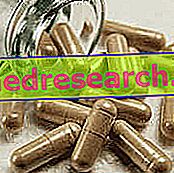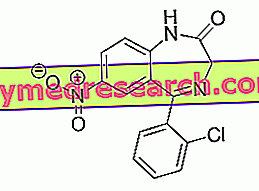"Have you ever heard of creatine? Creatine is used to increase muscle mass, endurance and improve recovery after physical exertion. This is why it is used successfully by many athletes both in the professional and amateur fields"
What's true in all this?
Creatine functions
Creatine is an amino acid discovered in the flesh by the French Chevreul (1832). Our body is able to synthesize it autonomously starting from three other amino acids called arginine, glycine and methionine respectively. Creatine is produced at the hepatic, renal and pancreatic levels
After production it is transported to the brain, heart and especially to the muscles (95%).
The daily requirement of creatine is about 2 grams and is satisfied 50% by diet (1g) and 50% by endogenous synthesis.
CREATINE IN FOODS:
Food | Creatine content (g / kg) * |
Beef | 4.5 |
Cod | 3 |
blueberries | 00:02 |
Herring | 6.5-10 |
Milk | 0.1 |
Pork meat | 5 |
Salmon | 4.5 |
Crayfish | Traces |
Tuna | 4 |
why does creatine work?
The positive effects of creatine on performance derive from its ability to release energy at times of maximum metabolic demand. Creatine is in fact a precursor for the formation of ATP, the main form of energy used by cells.

During muscle contraction, ATP turns into ADP releasing an energy-providing phosphoric radical. At this point adding a phosphorus atom to the ADP it is possible to re-synthesize ATP by replenishing the cells with new energy.
During a particularly intense effort phosphocreatine performs precisely this function, freeing its phosphorus atom and reforming ATP starting from ADP.
This energetic mechanism is very important during the transition from a condition of rest or moderate effort to a condition of maximum energy demand (for example during a trip, when an important load is raised or during the final sprint).
In fact, phosphocreatine represents an energy reserve pool that can be rapidly used to restore the ATP muscle content.
This brief metabolic analysis explains why creatine is particularly effective for maximal or sub-maximal shots or efforts (from 2 to 30 seconds). Its effects are practically non-existent for long-term sports such as triathlon or marathon (see: Energy systems in muscular work).
Intake doses
Creatine supplementation can lead to an increase of about 20% in phosphocreatine muscle reserves. However, about 30% of people are unable to increase these deposits probably because they already have maximal reserves of phosphocreatine in their muscles. For these subjects, its supplementation is completely useless.
From this initial premise it follows that creatine supplementation has a certain utility only in case of reduced dietary intake (see "vegetarian diet") or when metabolic demands increase (particularly intense physical efforts).
Numerous studies have been carried out with the aim of finding the most suitable doses and methods of intake to maximize the effects of creatine.
In professional athletes supplementation is normally done with a loading dose of 5 g 4 times a day (20 g / day) for 4-6 days followed by 2 g / day for 3 months (a recent study shows that this maintenance dose does not brings additional benefits on performance, Med Sci Sports Exerc 2005; 37: 2140-7)
A more "soft" approach involves taking lower doses, in the order of 2.5 - 6 g / day for no more than 2 weeks.
However, each month of oral creatine is followed by a month of abstinence.
The muscle has in fact a maximum capacity to store creatine (150 mmol / kg) and the higher the concentration the less the subject responds to new additions.
The endogenous production of Creatine during dietary supplementation tends to decrease and return to normal after a variable period of suspension of dietary supplementation (Persky AM & Brazeau GA: Clinical pharmacology of the dietary supplement creatine monohydrate. Pharmacol Rev 2001; 53 (2): 161-176)
After oral administration of creatine, its transport to the intracellular level depends on the actual need of the organism, and is positively influenced by the presence of catecholamines, IGF 1, insulin. For this reason it is often combined with branched amino acids and carbohydrates with a high glycemic index (the famous banana).
Caffeine on the other hand inhibits phosphocreatine resynthesis during muscle recovery so it is not recommended to take creatine caffeine and / or guarana simultaneously.
Side effects
More and more frequently, abuses or improper use of creatine are found, especially among young people. These are very dangerous behaviors as they are harmful not only for the portfolio but also for one's health.
SIDE EFFECTS
Dehydration and water retention: creatine gives an apparent sensation of increase in muscle mass thanks to increased intracellular water retention in the muscles. As a result of the massive use of creatine, an increase in body weight is therefore likely, which is particularly detrimental to sports performance during endurance races (about 3 'more on the marathon for every kg in excess)
Gastrointestinal disorders: if taken at high doses (above 20 g / day) creatine causes gastrointestinal problems and diarrhea to some individuals (caused by the unabsorbed surplus of creatine
Kidney problems: impaired renal function is not compatible with the use of creatine which is not recommended even in conditions of severe dehydration and in conjunction with the use of drugs that can compromise or only seriously commit renal function (probenecid, NSAIDs, cimetidine, trimethoprim).
CONTRAINDICATIONS
Use of diuretics
Dehydration
Individual allergy or hypersensitivity to Creatine
Deficiency of renal function
To conclude
Creatine improves athletic performance especially during intense but short-lived efforts (from 2 to 30 seconds) in about 70% of subjects.
Information on the correct dosage and its adverse effects is scarce. It is therefore advisable to consult a doctor to make sure there are no contraindications and to critically analyze your situation (creatine intake has very few positive effects when combined with a high-protein diet and moderate physical activity).



